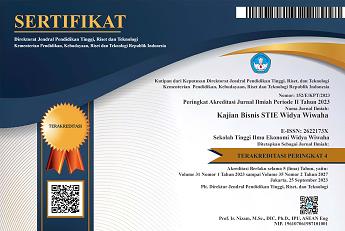PENGARUH KECENDERUNGAN PEMILIHAN RISIKO DALAM PENGAMBILAN KEPUTUSAN INVESTASI YANG DIMODERASI OLEH GENDER: PENDEKATAN EKSPERIMEN
DOI:
https://doi.org/10.32477/jkb.v29i2.275Keywords:
Risk Selection, Investment Decisions, GenderAbstract
This study aims to conduct laboratory experiments to examine the tendency of risk selection as a variable that affects managers in making investment decisions. Gender factor is used as a moderating variable in this study. Gender differences are thought to play a role as a variable that strengthens or weakens managers in making investment decisions. Research data collection was carried out using a 1 x 2 experimental design between subjects. Experiments will be carried out using a computer assisted program. Regarding the Covid-19 pandemic, the experiment will be carried out online with the help of zoom technology and google form with a limited time so that it approaches the experiment which is carried out directly through face to face. Hypotheses were tested using Pearson Chi Square statistical tools and ANOVA Two Way with Interaction. The result of this research is the tendency of risk selection affects investment decision making. while gender is not a moderating variable in this study.
Downloads
References
Atkinson, A. A., R. S. Kaplan, and S. M. Young. (2003). Management Accounting, 4th ed., Upper Saddle River, NJ: Prentice-Hall.
Baucells, M., and C. Rata. (2006). “A Survey study of Factors Influencing Risk-Taking Behavior in Real-world Decisions Under Uncertainty.†Decisions Analysis 3 (3): 163-176.
Baird, K.; Perera, S; and Meng, T.T. (2008). Manager’s propensity to take risk in project selection decisions: the effect of payoff magnitude, Australasian Accoutning Business and Finance Journal, 2(4).
Bonner, S.E. dan G.B. Sprinkle (2002). “The Effects of Monetary Incentives on Effort and Task Performance: Theories, Evidence, and a Framework for Researchâ€, Accounting, Organisations and Society 27:303-345.
Croson, Rachel, dan Uri Gneezy. (2009). “Sex Differences and Statistical Stereotyping in Attitudes toward Financial Risk.†Evolution and Human Behavior, 23 (4): 281-95.
Gudono, (2014). Analisis Daata Multivariat, Edisi 3. Yogyakarta. BPFE.
Henry Faizal Noor. (2009). Investasi, Pengelolaan Keuangan Bisnis, dan Pengembangan Ekonomi Masyarakat. Jakarta: Indeks.
Holt, C.A and S.K. Laury (2002). “Risk Aversion and Incentive Effectsâ€. American Economic Review 92(5): 1644-1655.
Johanes l, dan Taufik Diya. (2012). “Peran Faktor Psikologis Terhadap Keputusan Investasi Produk Mulia Pada PT. Pegadaian (Persero) di Kota Jambi.†Jurnal Digest Marketing. (2012). Vol 1, No. 3, ISSN: LM2302-4682.
Kahneman dan Amos Tversky (1979). “Prospect Theory: An Analysis of Decision under Risk,†Econometrica, 47, 263-291.
Laughhunn, Dan J.; John W. Payne; dan Roy. L. Crum (1980). “Managerial Risk Preferences for Below Target Returns,†Management Sci., 26 (1980), 1238-1249.
Liyanarachchi, Gregory & C. Newdick. (2009). The Impact of Moral Reasoning and Retaliation on Whistleblowing: New Zealand Evidence. Journal of Business Ethics, 89:37-57.
March, J.G.; dan Z. Shapira (1987). “Managerial Perspective on Risk and Risk Takingâ€, Management Science 33 (11): 1404-1418.
Prasetya, David., Siregar, Baldric. (2012). “Pengaruh Kecenderungan Manajer dalam Pembuatan Keputusan Terhadap Payoff Magnitude.†Jurnal dan Prosiding SNA. FE Universitas Indonesia.
Saragih. (2008). “Faktor-Faktor yang Mempengaruhi Keputusan Investasi pada Perusahaan Barang Konsumsi di Bursa Efek Indonesia.†Universitas Sumatera Utara, Medan.
Sitkin, S.B. dan Pablo, A.L. (1992). Reconceptualizing the Determinants of Risk Behavior. Academy of Management Review, 17, 9-38.
Tandelilin, Eduardus. (2010). Portofolio dan Investasi Teori dan Aplikasi. Edisi Pertama, Kanisius, Yogyakarta.









